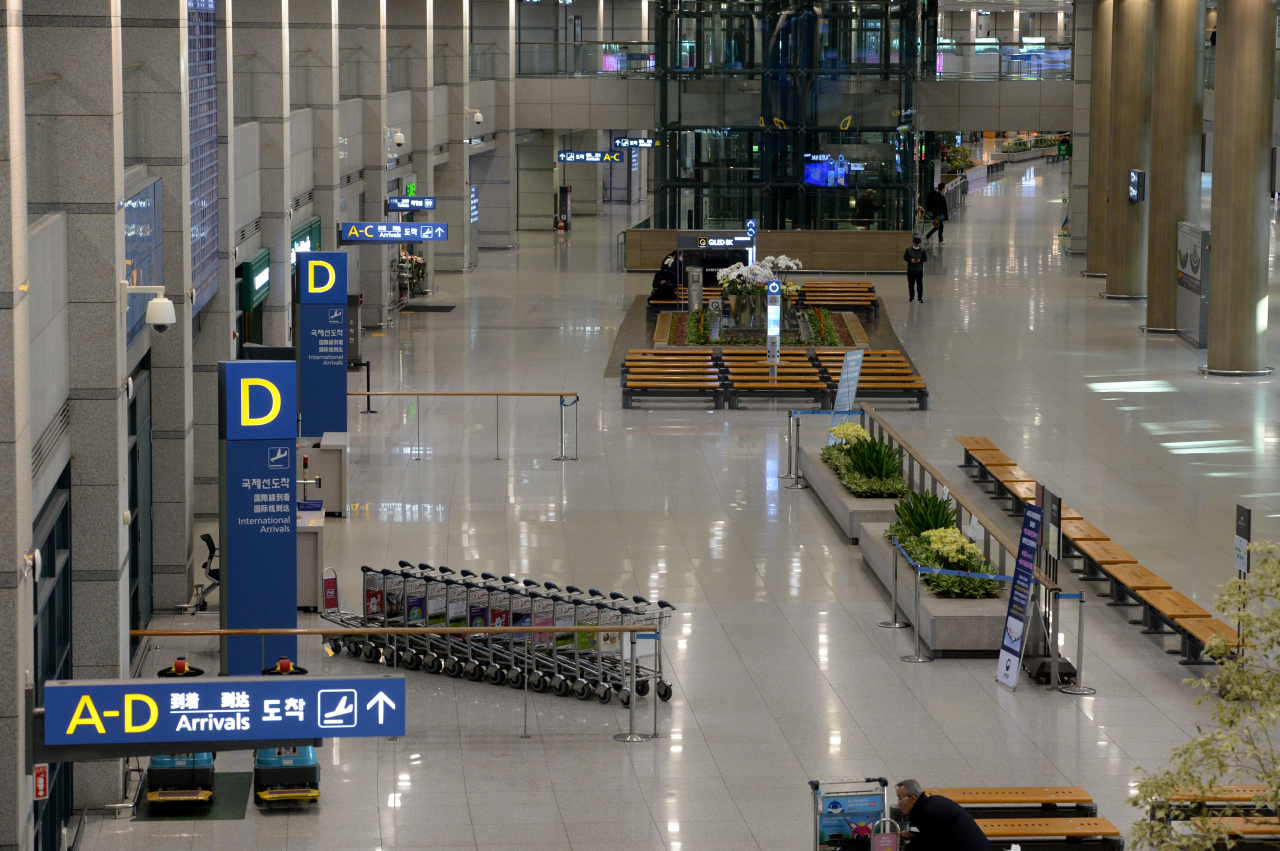 |
The arrivals hall at Incheon Airport, the main international gateway to Korea, is empty Monday morning. (Yonhap) |
As the entire nation struggles with the ongoing spread of COVID-19, the tourism industry -- both inbound and outbound -- has been one of the hardest hit by the virus outbreak.
More than 100 countries around the world are restricting the entry of all travelers from Korea, as of Monday, pushing outbound travel agencies to the brink.
Hana Tour and Modu Tour, Korea’s top two outbound travel agencies, have reported major losses in sales due to the COVID-19 outbreak.
Hana Tour sent 49,000 travelers overseas in February, which marks an 84.8 percent drop from the same period last year. The tour agency has declared an emergency, deciding on a three-day work week for employees. It has also been suggesting employees take unpaid leave.
Modu Tour recorded 37,000 outbound travelers last month, marking a 77 percent drop from the same period last year. Starting this month, the tour agency’s employees will take paid leave of up to two months.
Due to the spread of COVID-19 in Wuhan, China, sales to China were halted earlier this year. Cancellations for trips to Japan and Southeast Asia followed, after COVID-19 cases were reported there. After cases of viral respiratory illness of Koreans who had traveled to Thailand and Singapore were reported, sales for the Southeast Asian region dropped, too.
Both travel agencies have applied for support funds from the Ministry of Employment and Labor last month, requesting the government to partly cover the wages of their employees. According to the ministry, a total of 1,256 travel agencies signed up for the state-funded support from Jan. 29 to Feb. 3, accounting for 28.5 percent of the total of 4,408 applications.
Compared to the Middle East respiratory syndrome crisis in 2015 when 297 travel agencies signed up for the funds, the number of applications for travel agencies has quadrupled.
The crisis has elicited a toll on the inbound tourism sector, too, which had been heavily reliant on the Chinese market. Last year, Chinese tourists accounted for 47.6 percent of Korea’s inbound tourism earnings, with Chinese tourists spending an average of $1,887 per person, 1.4 times higher than the overall average of $1,342 per foreign tourist.
“I have not had any work this year,” a tour guide who arranges small-sized Chinese and, Japanese group tours said. A 15-year industry veteran, she said she has not seen anything like this before.
“Being a freelancer, travel agencies link me with tourists. But the agencies do not have any customers in the first place. Other tour guides are out of work, too,” she said.
With the Japanese border control measures that went into effect Monday, the Korean inbound tourism has been dealt a major blow.
According to the Korea Association of Travel Agents, a total of 109 travel agencies have closed between Jan. 20 and March 6. On March 3, the association called on the Labor Ministry to designate the tourism industry as a “special employment support sector,” a measure that will allow employees in the tourism sector to benefit from governmental support.
By Im Eun-byel (
silverstar@heraldcorp.com)






![[Weekender] Korea's traditional sauce culture gains global recognition](http://res.heraldm.com/phpwas/restmb_idxmake.php?idx=644&simg=/content/image/2024/11/21/20241121050153_0.jpg)

